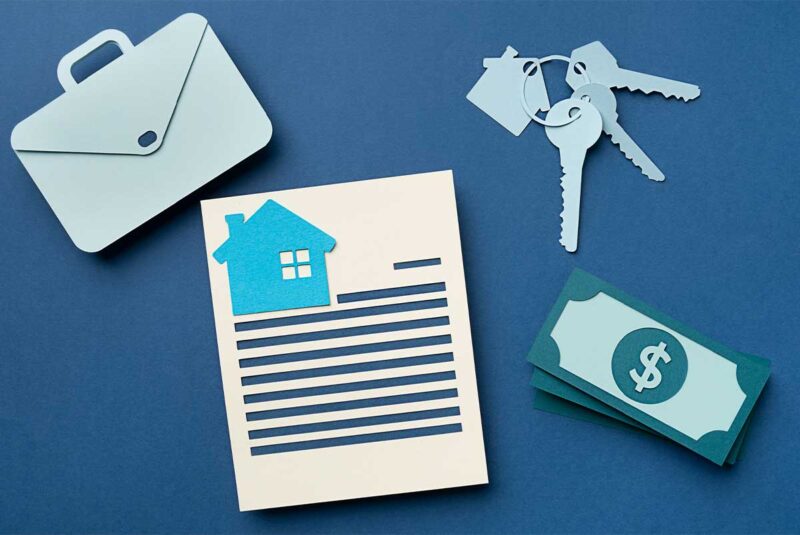Ready To Buy a Home?
Get Approved to Buy a Home
Rocket Mortgage® lets you get to house hunting sooner.
No lender is one-size-fits-all. For example, different lenders can offer various types of mortgages, and there can be major differences in their fees and loan terms. Asking questions before committing to a lender is a critical step in the home buying process.
We’ve put together what we consider the 10 most critical questions to ask potential mortgage lenders. You can absolutely – and probably should – ask more than these 10 questions, but this list will provide a solid foundation for deciding whether or not a mortgage lender is right for you.
1. What Mortgages Do I Qualify For?
There are different types of mortgages. The ones you’ll be eligible for will depend on your income, debt-to-income (DTI) ratio and credit score.
Don’t sweat, though. A lender can help you figure out those crucial numbers and familiarize you with the different types of mortgage loans.
Here are some of the common types of home loans you’ll be looking at:
- Conventional loans: This is the most common type of loan, accounting for 76% of home purchases in 2022.[1] There are strict credit score and down payment requirements, but the loan repayment terms are usually favorable compared to other loan types.
- Government-backed loans: These loans are targeted to lower-income borrowers, borrowers with a credit score below 620 and borrowers who will make a down payment that’s less than 20%. We’re going to focus on U.S. Department of Veterans Affairs (VA) loans, which help qualifying veterans become homeowners, and Federal Housing Administration (FHA) loans, which are designed for borrowers with lower range credit scores and past credit issues.
- Fixed-Rate Vs. Adjustable-rate mortgages (ARM): Both conventional and government-backed loans can come with fixed or variable rates. As the name suggests, a fixed-rate mortgage comes with an interest rate that stays the same for the length of the loan. By contrast, ARMs come with interest rates that may adjust at regular intervals for a set amount of time. Usually, you’ll pay a lower interest rate during the ARM’s introductory period. Once that period expires, you’ll get a new fixed rate based on market conditions.
In addition to telling you what mortgage options you qualify for, have the lender walk you through the pros and cons of each one. If you do this with multiple lenders, you’ll really begin to understand which mortgage option looks best for your financial situation, and you’ll be able to ask better follow-up questions.
Home is worth it.
The mortgage process can be exciting, and we’ll be with you all the way. Take the first step to owning a home. You’ll be glad you did.
Hard credit check
To tell you with confidence which loans you qualify for, your lender will need to run a hard credit check. In the short term, this will cause your credit score to go down slightly. The good news is that it should bounce back quickly, and there are no long-term negative consequences to shopping for credit.
Because of the slight dip to your score in the short term, it’s recommended that if you want to compare lenders, you should have multiple lenders pull your credit within a 14-day period. That’s because hard credit checks done within 2 weeks of each other count as the same credit check on your credit report, allowing you to comparison-shop lenders.
2. Are There Mortgages I Qualify for That You Don’t Offer?
Not all lenders offer all types of mortgages, especially when it comes to government-backed loans. U.S. Department of Agriculture (USDA) loans, VA loans and FHA loans are commonly omitted from individual mortgage lender’s service offerings.
This means that the best loan for your financial circumstances and goals might not even be offered by the first lender you approach. This is another reason why we advocate talking to multiple lenders.
This is also a test for you to build trust with the lender. Naturally, they’ll want you to use one of their loans, but they should still be honest that you potentially have other options. Think of it this way: If a chef explains to you why they don’t offer seafood, that doesn’t make them a bad chef. It also might benefit you to find out what the chef specializes in preparing, and why.
3. What Are the Down Payment Options?
Once you decide on the type of loan you’d be applying for, you should ask the lender about the options for your down payment. Here are some factors that will fluctuate based on the type of loan you choose and the lender.
Lender Down Payment Variables
Minimum down payment requirements are dictated by the loan type. However, different lenders can apply “overlays,” which are additional requirements borrowers must meet to qualify for a loan. In practical terms, this means you could owe a different down payment for the same loan type depending on the lender’s policies.
Lenders may offer to contribute toward your down payment as a part of a promotional offer. This can affect the minimum down payment requirement. For example, a lender may normally require 5% down on a house but be running a promotion where they’ll accept 3% down.
Depending on where you live, there may be different state-level down payment assistance programs available. Mortgage lenders can also have their own down payment programs, so it’s worth asking each lender what your options are.
It’s common for lenders to accept gift money toward your down payment. The rules around who can contribute gift funds and how much they can give are dictated by the loan type. However, lenders can have different policies regarding the mechanics around the contribution – like when the funds need to be in your account and what verbiage needs to be included in the gift letter. If you plan to use gift money toward your down payment, it’s wise to have this conversation with your lender ahead of time.
4. What Is the Interest Rate?
Interest rates are important because they’re one of the biggest factors in what your monthly mortgage payment will be. A property purchased at the same price, with the same down payment and loan terms would have a smaller monthly payment with a 6.75% interest rate versus a 7% interest rate.
Lenders will charge different interest rates based on their own analysis of the market conditions combined with their business needs. As a borrower, it’s worth asking them to provide you with their interest rate with zero points so you can compare it to others.
A word of warning: You’ll need to move quickly. Interest rates fluctuate constantly. So at a minimum, if you want to compare rates, you’ll need to ask multiple lenders for their interest rates on the same day. Otherwise, you could be drawing conclusions based on outdated information.
You’ll also need to incorporate lender fees into this analysis. More on that in the next section.
5. What Is the Annual Percentage Rate? (What Are Your Fees?)
Annual percentage rate (APR) is the key metric when it comes to comparing loans because it depicts the total cost of borrowing money. It combines the interest rate you’ll pay with any additional fees or costs from the lender.
The mortgage origination fee, any mortgage points purchased and closing costs are examples of costs that are included with APR. These costs and fees aren’t included in a standard mortgage interest rate a lender offers. Once you have the estimate in front of you, we recommend talking to your lender about all of the fees included, so you can isolate any unique costs that stand out.
Be wary! Some lenders advertise lower interest rates only to sneak in higher fees. Be sure to look at APRs when comparing loans to get a fair and true comparison of the total cost of your mortgage.
6. Can I Lock In My Interest Rate?
Rate locks and float-down clauses are straightforward concepts that can help you take advantage of the interest rates you were quoted when you first sat down with lenders.
- Rate lock: A rate lock is used when you agree to the interest rate on a mortgage and are ready to move forward. The rate is “locked in” and won’t change during the specific period you and the lender agree on. Locking the rate protects you in case interest rates go up. However, depending on interest rates, a lender may or may not recommend a lock.
- Float down: If you lock in your rate and interest rates go down between the time you paid for the rate lock and your closing, the float-down option allows you to take advantage of the lower interest rate. Some lenders offer this as part of a rate lock, but it’s not universal.
7. What’s My Estimated Monthly Payment?
While the lender will walk you through your interest rate and mortgage rates, they may not break down the monthly mortgage payment unless you ask. Many fees can get folded into the mortgage payment as well.
Ask your lender to break down the monthly payment into these six categories, so you can understand where your money’s going.
- Principal
- Interest
- Mortgage insurance
- Property taxes
- Homeowners insurance
- Additional fees
Knowing the monthly mortgage payment ahead of time can help you decide if you can afford the house and plan a monthly budget.
It’s a lot of legwork, but we can’t overstate how important isolating variables is to truly understand what different mortgage lenders are offering you.
For example, if you put less than 20% down on a conventional loan, you’ll owe private mortgage insurance (PMI). If you don’t break down the estimated monthly mortgage payment, you’d be unable to compare how much PMI will cost you per month, depending on which lender you use.
8. Can You Buy Mortgage Points?
Many lenders let buyers purchase mortgage points. These optional discount points are prepaid interest and help reduce your qualifying interest rate. But depending on how long you plan to stay in your new home, as well as what you can afford upfront, mortgage points may not be a good fit for your situation.
Every lender has different practices around selling mortgage points. Ask them if they offer mortgage discount points, how they work, how much they will cost and potentially save you, and what you might be eligible for.
9. How Much Are My Estimated Closing Costs?
There are lots of fees to keep track of. Closing costs are extra expenses you pay on top of the home’s purchase price. They usually equal 2% – 6% of the loan amount.
Mortgage lenders are legally required to give you a Loan Estimate that details all this information. Feel free to ask the lender to walk you through each fee, so you’ll know what’s getting bundled into your closing costs.
Here are some of the fees you can expect to see:
- Appraisal fees
- Origination fee
- Service fees
- Application fee
- Credit check fee
Have your lender walk you through each fee and explain its cost and purpose. You should also confirm that the costs and fees are part of the closing costs and not the mortgage payments.
10. How Fast Can You Close?
Some lenders may be able to close within 45 days (or less), while others may take much longer. It’s important to iron this out with your lender ahead of time, because the time to close will be included in your offer.
In ultra-competitive markets, offering a faster closing time could be the difference between getting your offer accepted or returning to the house hunt.
Even if you don’t plan to use it as a negotiation point, it’s good for you to understand the average time line your lender operates with.
Tips for Comparing Lenders
Now that you have an initial list of questions, we’ve put together some other tips to help you shop lenders:
- Compile a list of lenders ahead of time: Remember, you have 14 days from your first hard credit check for other hard pulls to count as the same one. Take advantage of this, so you can talk specifics with multiple lenders.
- Compare interest rates on the same day: Remember, interest rates fluctuate all the time. To get a sense for how one lender compares to another, you need to get rate quotes from them on the same day. Otherwise, the information could be outdated. Also, remember to look at APR and not just interest rates.
- Ask all the questions you need to: Our list of 10 questions was to help get you started, but you should feel comfortable asking each lender you speak with as many questions as it takes for you to feel comfortable. They deal with these loans every day, so take advantage of their industry knowledge and learn everything you can to make the best decision for you.
- Get preapproved with multiple lenders: There’s nothing wrong with getting preapproved with multiple lenders – in fact, it can strengthen your chances. For example, telling a lender you’ve been preapproved with another lender might incentivize them to look for additional things they can do to earn your business.
Final Thoughts on What To Ask Mortgage Lenders
When you’re shopping around for lenders, focus on asking questions that clearly outline the entire mortgage process step by step.
Look for a lender who’s fluent in mortgage-speak but answers your questions in a simple, clear and jargon-free way. No question is off the table. Take the time to find the lender that’s right for you.
Take the first step toward buying a home.
Get approved. See what you qualify for. Start house hunting.
The Short Version
- Make sure to go through the pros and cons of each mortgage you qualify for with the lender. Doing this with multiple lenders will increase your confidence in your decision
- In addition to asking about interest rates, you should also ask about the annual percentage rate (APR), so you can also compare lender fees
- Ten questions is just a starting point. You should ask your lender as many questions as you need to in order to feel comfortable moving forward with the mortgage process
U.S. Census Bureau. “New Houses Sold by Sales Price: United States.” Retrieved August 2023 from https://www.census.gov/construction/nrs/pdf/quarterly_sales.pdf




